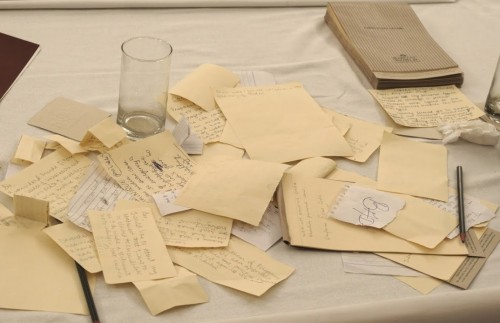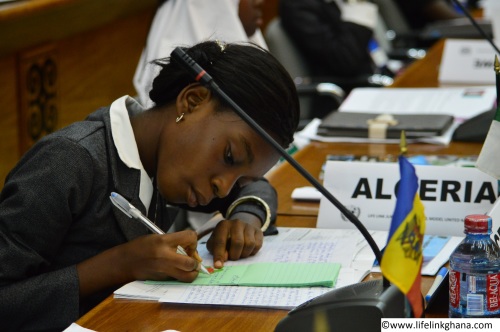Communication is at the heart of Model UN. Without communication, there is no way to share ideas, explain viewpoints, and form blocs. While a great deal of communication occurs during speeches in moderated caucuses and meetings in unmoderated caucuses, they are generally addressing a group of people, if not the committee as a whole. It is hard to have a conversation with an individual during the conference. However, note passing is an often underutilized mechanism for individual correspondence. Note passing allows you to access anyone in the room and open a line of communication with them. The delegates who utilize this resource and maintain many lines of communication around the room are generally the best delegates in committee.

Committee Notes
Credits: Kali Walia
The key to good note passing lies in balancing substance and presentation. In regard to substance, it is necessary to start off the first letter to a delegate with a reason for why you are contacting them. It may be that you met them before committee started and engaged in productive conversation; it may be that you really enjoyed a certain policy the delegate proposed during the opening speech; it may be that you thought the delegate’s outfit was on point. Whatever the case may be, there must be a springboard for a conversation to stem from.
In regard to presentation, there are a few main points to succeeding. First, use your real name rather than your country’s and ask to know theirs. After learning their name, use it when talking to them. While other delegates will be calling the person by the country they are representing, you will be calling them by their name, symbolizing a closer relationship. Second, it is often good to use more casual language over flowery English. With the goal of connecting to people with your notes, talk like two people would normally talk! They will find it impersonal if you use the same language as in your moderated caucus speech. However, that does not mean that your notes should not be respectful. It is highly important that your notes are appropriate for the professional setting Model UN is. Failure to abide by that standard can result in delegates reporting your notes to the chair and a range of consequences. Third, it is necessary to build the relationship over the course of multiple notes. Do not open to the delegate with a demand like “Be a part of my bloc” or “Work with me.” You must first establish a mutual line of communication, based on some introduction. From there, you must establish connection regarding solutions and policies, so that your plans of action line up when you actually start to talk face to face. Next, you must start to know them as a person: where they go to school, what music they listen to, etc. Once a rapport has been built, you can then ease into forming a bloc with them or collaborating with them in some manner. Each note should be short and succinct so that you do not use up too much of the other delegate’s time. Finally, when writing notes, they should be neat and organized. Do not rip a piece of lined paper and write a note on it, just keep a stack of index cards with you. Furthermore, use neat handwriting to show that you are putting time into writing the note. Neat handwriting also ensures that the delegate can actually read your note. Finally, reply to notes in a timely fashion, sending back replies as soon as you can. With delegates receiving multiple notes from various people in the committee, putting effort into the note can set you apart.

A Delegate Preparing Notes
This process outlines one note passing process rather than a single line of communication which will not lead to a strong bloc. If this note-passing model is duplicated multiple times to many people, you have a higher chance of having more delegates who will want to work with you. Thus, during the speaker’s list, you should aim to open as many lines of communication as possible through taking notes on what the delegate is presenting in their speech and citing that in the note. After the first unmoderated caucus, you may also look for delegates who did not have a bloc or were on the outskirts of a bloc and contact them as well. Overall, note passing is one of the most important tools of Model UN as it forms the foundation for individual conversation. This individual conversation is key to building a bloc and forming friendships at the conference.

